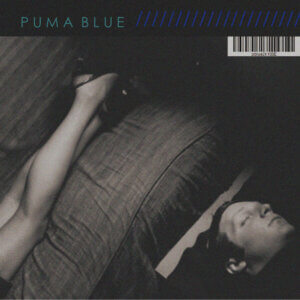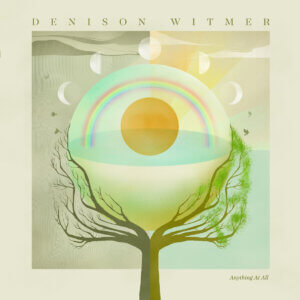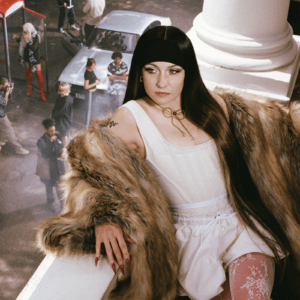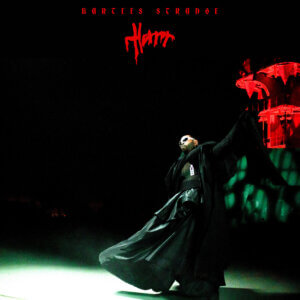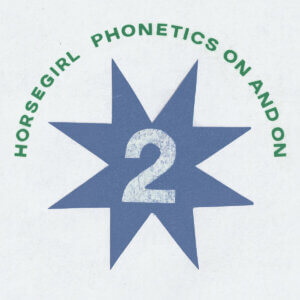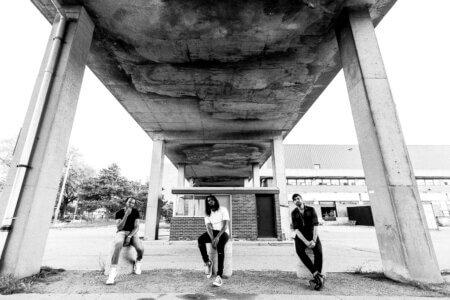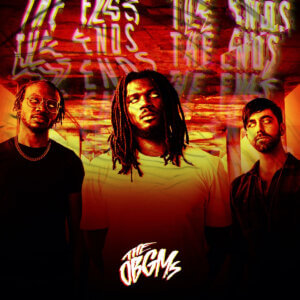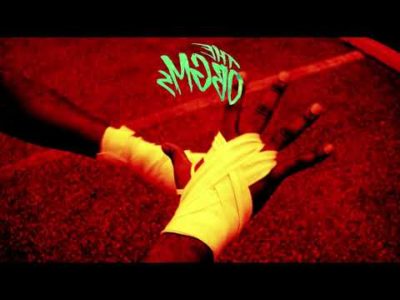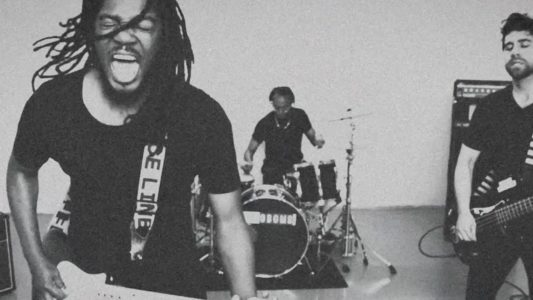The OBGMs embrace new beginnings
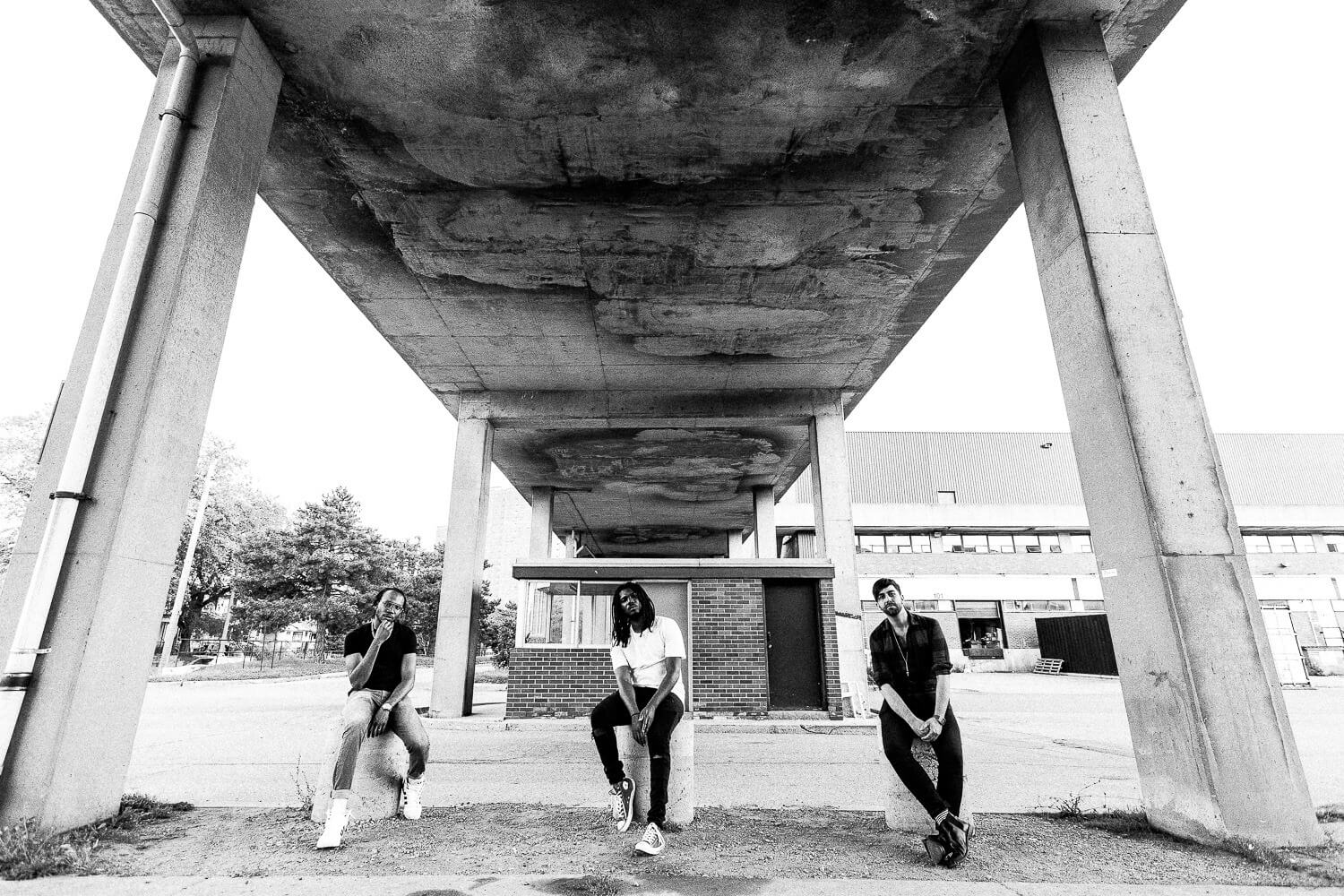
“I’ll fuck you up”. These are the first words that come bruising out of the OBGMs vocalist/guitarist Densil McFarlane on “Outsah,” the opening track off the Toronto outfit’s much-anticipated sophomore LP, The Ends, and damned if it isn’t a thrilling—albeit threatening— proclamation.
A concise, quick-shifting collection, the 10-song LP finds McFarlane, drummer Colanthony Humphrey and bassist Joseph Brosnan pivoting between tubes-bursting pop-rock (“Fight Song”), bittersweet indie anthemry (“To Death”), and the occasional rap-rock groove (“WTFRU”). In the case of “Outsah”, rhythmically hypnotizing bongos pull you even further into the group’s punk-defying grip. It’s ostensibly the OBGMs’ most adrenalized and alluring offering yet, but it might not have existed at all had McFarlane not spiralled himself into an existential, arts-related crisis a few years back.
In early 2018, shortly after wrapping the tour cycle for the previous year’s self-titled debut, McFarlane was burnt on making music with the OBGMs. As he’d put it in a press release: “I was making [music] to fit a certain mold, but it lacked truth. It lacked honesty.” He felt it was time to pump the brakes, and stepped away from the band he loved for six months. Absence makes the heart grow fonder, though, and eventually he broke his Fender Strat back out of its case to write a few riffs. Hundreds of songs ideas would soon pour out of him, with the band bringing the best of the bunch to Toronto’s Dream House studio to track with producer Dave Schiffman (Trash Talk, PUP). If anything, The Ends is a testament to hard work eventually paying off.
“This is the first record we’ve made in which I didn’t have to compromise,” McFarlane tells Northern Transmissions. “I’m very happy with it.” A prolific tweeter never shy to share his opinion on racial justice, NBA stats, and the state of punk rock, McFarlane took some time out of his day to speak with Northern Transmissions on how he rediscovered his groove. This interview has been edited and condensed.
Northern Transmissions: Part of the story behind The Ends is that it was written after taking a long hiatus from the band, and music-making in general. What led to that decision, and what was its immediate impact?
Densil McFarlane: Yeah, man, I had to take a break. Honestly I was not happy with where we were in music, and the process of making music wasn’t conducive [to a way that] could be successful. We’d been in a band for a long time— a lot of people don’t know that we’ve been in this since 2007. When you do it for that long and you’re not making the strides you think you should be making, it hurts. It hurt me, man. I had to take time off to figure out 1) am I good enough to do this and 2) if I’m not good enough, what am I doing wrong? What’s the problem, here? I had to revamp my whole approach to songwriting.
Honestly, it’s been a blessing [because] I learned how to write a song. I completely restructured how I do things. In that process, I found out how much I love doing this. People that really love things find a way to do them throughout the day, and it doesn’t feel like work. I’m always sitting next to my guitar and playing chords, or beatboxing voice notes into my phone. I’ll do that 5-6 times a day. You’re only going to do that if you’re obsessed with [making music].
NT: If you’d been documenting a ton of riffs and musical ideas on your phone, was there specific eureka moment where you felt you’d finally cleared the hurdle with your songwriting?
D: When I beatbox these things into my phone, I automatically think it’s gold. I think it’s the best thing ever. ‘Look at this, another hit!’ But when I go into the studio to put bass and drums on it, it may not sound as good. I went through at least eight months of going to the studio and making hundreds of songs that I hated. I loved them during the week, but hated them once I put down all the instruments. The eureka moment came with ‘Outsah,’ which is one of the last songs I made before I took a flight to L.A. to talk to a producer about our music, and how to make it better. And then I was like, ‘we already found it!’ That moment was joyous to me. It was great. I have a video, I may post it.
NT: Is it possible the key to “Outsah” is that prominent bongo?
D: We were blessed to work with Dave Schiffman, who continuously drove me to be a better songwriter. We had already liked the song, but we had a bunch of extra days in the studio where we could look at the songs and say ‘is there anything we can do to make them better?’ I was like, ‘I know a guy who can play the congas and the bongos…we should just put some bongos on this.’ I sent him the song on a Thursday, and he came in on Friday with some ideas. As soon as he put them down, everybody’s face in the studio changed. We were all like, ‘this is amazing!’ Roberto Molina is his name, out of Tonx, and man, he completely changed the album for the better. He’s a perfect player, highly recommended. Wildly professional, and just a killer on percussion.
NT: Can you say some more about “Outsah”? The first line on the record is ‘I’ll fuck you up…’
D: It’s true, and it’s very likely. [laughs] When I wrote that song on July 3, 2019, I was like ‘I don’t want to say much here’. That’s the problem, we were talking too much. How do I get my point across with as few words as possible? I’m angry, people aren’t playing attention to us, and we’re out here making shit that doesn’t sound like anyone. What are we going to do? I thought, ‘You know what, man, the next person that talks, I’m going to fuck him up.’ That’s how the song got made.
NT: On “All My Friends”, one key lyric is ‘I need the love of my home city’. How does that reflect the overall OBGMs experience so far?
D: ‘Fuck That, Need Hollywood’— that’s the next line. The whole album is about comeuppance, and what we’ll do for it. It’s also the end of relationships—the end of all things, whether it’s bad relationships, or bad experiences. Toronto is a city that I love. My city shapes who I am, but it’s a city where you need to be very popular in the United States or the UK before they’ll even recognize you. I love it, because when I do make it in those places I would love to celebrate with the people in my home city. I hate it because unfortunately we don’t have a homegrown thing in which the Canadian music industry knowingly uplifts and supports their artists like their other exports. So If I get Hollywood, I’ll get Toronto.
NT: Can you tell me about the community that you do keep in Toronto, though, like with Clairmont the Second, who directed your “Outsah” video, or other friends like PUP?
D: Clairmont the Second is the most talented artist I’ve ever met. I’ve never seen an artist that was able to make music at that level and make [accompanying] visual art that’s also at that high a level. If you ever take in his videos, understand that this guy also made all the lyrics, all the music. I’m blessed to know Clairmont the Second. I’ve known him for most of his life.
I’m also blessed to know Stefan Babcock from PUP. Surrounding myself with these people has really helped me as an artist. These guys are obsessed. This isn’t a hobby for them. With Stef, I got connected with him last year through Dave Schiffman, who basically said, ‘this could be a good person to collaborate with, to help uplift songs.’ And I was like, “Man, I don’t need help uplifting any songs. I’m John Lennon!’ But I’ve never had people collaborate on my songs, ever. My band barely collaborates with me. I present the songs, we play the songs. But with [Stef], it was great.
Whatever I’ve beatboxed into my notes generally ends up becoming the song. I’m not necessarily driving it further past that. That’s 30 seconds of thought into my phone that turns into a song. It doesn’t have the levels of development that it could have. I sent him 50 demos, and we picked three or four to work on. He was on a seven-week tour of Europe as he was doing this, jumping off stage to send me demos of my own shit—this guy just breathes music. But if he’s able to do this with my stuff, then it becomes a challenge to me to become better.
NT: Do you feel more laser-focused now, after having taken some time off to reflect, and also after being inspired by those other artists?
D: I feel like The OBGMs [their 2017 self-titled album] was the ‘happy to be here’ OBGMs. If you look at a lot of marketing and what we were saying in the interviews around that time, you’ll get that vibe— A lot of appreciation. But I’ve grown past just being appreciative. I deserve to be here! And if I deserve to be here, I’m going to make sure people know that. I’m not bashful about who the OBGMs are. I think we’re definitely one of the best bands in Canada. I don’t know of a band that sounds like us, and I would love for somebody to tell me of one. Haven’t heard ‘em yet! I think we’re pushing boundaries. I’m out here calling myself Kurt Cobain; I’m out here calling myself Kanye West. If I’m going to talk that type of shit, I need to back it up. I believe we are [backing it up]. I’m more aggressive than ever, I’m writing and playing more than ever, and I think we’re going to be one of the bands that, post-pandemic, will be running it.
NT: There was a particular tweet a while back where you were talking about ‘coming for rappers’ spots’. Can you tell us about developing your vocal approach for The Ends?
D: It’s funny, because you’ll have an artist like Machine Gun Kelly. He started out as a rapper—a very skilled rapper—and now he’s dabbling in pop punk. It’s wildly celebrated, right? Typically if you’re going to take a black artist, even in alternative music, it’s always going to draw comparisons to hip-hop. We’re segregated into our own lane [within rock]. And if people mix rap with rock too much, there’s a film of trash that’s attached to it, which I hate!
I don’t like boxes. I refuse to be in any box, ever. I started out as a producer and a rapper; I was a singer in a rock band. I’m going to do what I want to do, period. If you guys think this is the best rapper, I think I can beat them. I welcome the challenge. There are a lot of rappers out right now that aren’t skilled. They don’t make timeless music; they’re making disposable music. But there are artists like Clairmont the Second that are making timeless music. I don’t want to battle these trash rappers, I want to battle somebody that’s making timeless music. It’s time to come for their spots. It’s time to aspire to be better, and kick these other rappers to the side. In the future, you’re going to see OBGMs mixtapes, acoustic albums, and pop albums. Fuck a box. If you’re a country artist, a pop artist, a rapper, or a rock artist, it doesn’t matter. I’ll come for your spot.
NT: If one of the goals is to make timeless music, how do you look back on your Interchorus EP [the OBGMs debut release]?
D: When Interchorus happened, I had just learned how to play guitar. When we recorded it, I thought I was the best songwriter in the world. When I listen to it now….it’s absolute trash [laughs]. But I highly recommend listening to it. We were still doing cool shit back then. It may not have been the best lyrically, or musically, but we were taking risks.
NT: Paraphrasing a few more tweets of yours, can you actually be both the Steph Curry and Damian Lillard of rock at the same time?
D: I think I can! This is the way I feel about it: I make those comparisons because I do believe we’re actually changing the dimensions of the rock game, just like Steph Curry did to basketball. I was a basketball player growing up. Defences would start at the three point line, and on offence you’d walk up to meet them there, and the [play] would start. What Steph Curry did was [instead of walking up] to where [the defence] were, he started shooting from half-court! It changed the dimensions of the game. So, we want to make pop music. We’re black, and we’re already different….we’ve also got some groove and some soul. We’re going to deliver all that in a way that changes the landscape of punk and rock. And with Dame? Oh boy, Dame’s a killer! Steph is a nice guy, but Dame’s a killer. That’s how we blend them together—we’re not playing around.
The Ends is out October 30 through Black Box
Latest Reviews
Tracks
Advertisement
Looking for something new to listen to?
Sign up to our all-new newsletter for top-notch reviews, news, videos and playlists.
